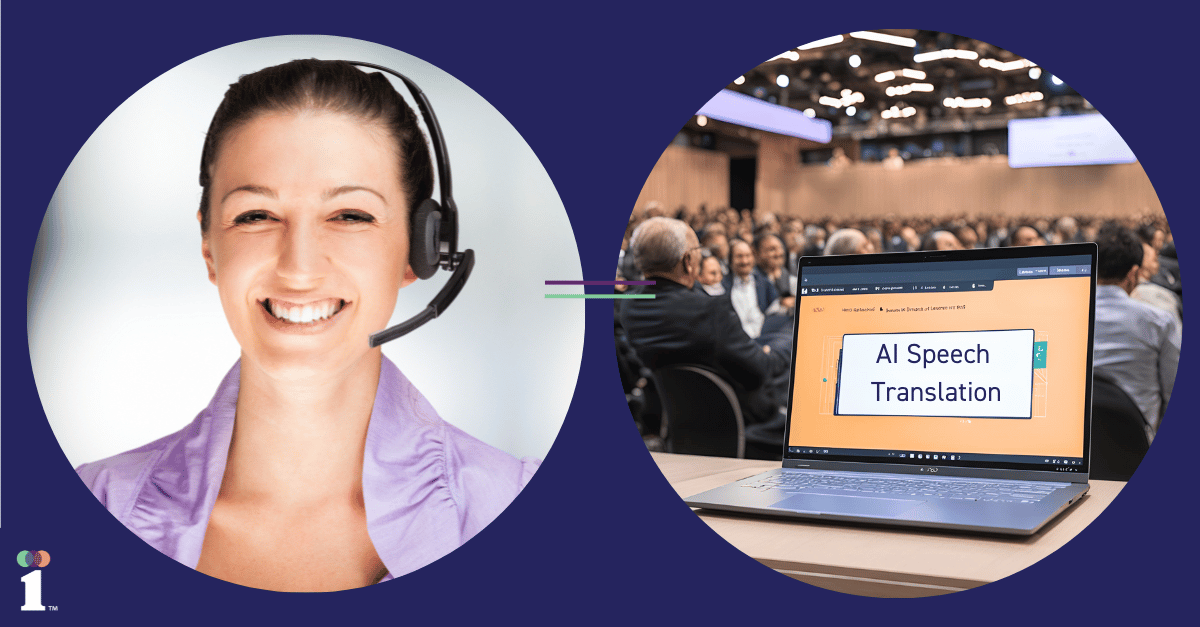
AI technology has made its way into language solutions. Organizations can now choose between professional interpretation performed by a human interpreter and AI speech translation, an advanced technology using AI-generated voices.
You may be wondering: What exactly is the difference between professional interpreting and AI speech translation? In this blog post, we will introduce you to the two very different solutions, each with their own distinct benefits, and highlight how we support our clients in choosing the ideal solution for their needs.
Human Intelligence Versus Scalable Efficiency
AI speech translation promises efficiency and speed, but only human interpreters bring cultural sensitivity, common sense, and a deep understanding of context. The event and conference organizers we work with typically look for the highest possible quality when it comes to language interpretation. At high-profile live events and meetings with highly specialized topics and terminology such as legal or medical, they cannot afford any misunderstandings and therefore prefer to work with professional interpreters who can take immediate corrective action in the event of an inaccuracy.
While AI provides consistent, accurate live translation at a considerably lower cost, the machine cannot always capture the nuances of language in the same way as human interpreters. The AI software delivers an accurate word-for-word live translation of speech. In comparison, human interpreters decode emotions and consider non-verbal cues and tone of voice when capturing the subtle nuances of the spoken word.
Meanwhile, AI tools don’t get tired and don’t need coffee or bathroom breaks. This expands the possibilities for more multilingual events, conferences or business communication that previously had no access to an interpreter. AI speech translation is a great solution in situations where an interpreter is not an option, e.g. when there is no budget available or when a human interpreter is simply not available at short notice.
In our role as a consultative service provider, Interprenet understands the benefits and limitations of each solution, empowering businesses and event organizers to make informed decisions that meet their needs and objectives. Here is a comparison of the two solutions.
Professional Interpretation: Unveiling the Power of Human Intelligence
Nuances and Cultural Sensitivity: Human interpreters possess an innate ability to capture the intricacies of language, decipher cultural nuances, and adapt to non-verbal cues, ensuring accurate and culturally sensitive communication.
Contextual Understanding: Skilled interpreters offer contextual comprehension, going beyond mere words to capture the underlying emotions, intentions, and deeper meaning of the conversation.
Dynamic Adaptability: Human interpreters can swiftly adjust their approach based on the evolving dynamics of a conversation, responding to tone shifts, hesitations, and interruptions in real time.
Subject to Human Limitations: Human interpreters, while invaluable, are susceptible to fatigue and physical limitations. To ensure consistent accuracy over extended periods of time, we always have the simultaneous interpreters work in pairs so that they can take turns every 20 to 30 minutes. In this way, the interpreters stay fresh and deliver the most accurate interpretation possible.
Cost and Logistics: Employing human interpreters for large-scale events may present logistical and financial challenges, especially when considering travel, accommodation, and scheduling arrangements. Fortunately, at Interprenet we offer Remote Simultaneous Interpretation as a cost-effective alternative that provides the same high quality as having interpreters onsite.
AI Speech Translation: Exploring the Promise of Innovation
Efficiency and Scalability: AI speech translation is a rapid and scalable language solution for live meetings and events that require low-cost “interpretation” that's still highly accurate. To ensure a high level of precision, we recommend creating a glossary before a client's event. This ensures that people's names, brand names and technical terms are pronounced and translated correctly.
Consistent Accuracy: When trained appropriately, AI algorithms consistently deliver accurate translations. With scripted speeches in particular the AI-generated speech translation performs very well, because the information flows logically and intelligibly. AI solutions, however, are restricted to languages with high training data volume. We can currently translate from and into 80 languages to enhance the scope of your live event, and the list keeps growing.
Understanding of Humor and Irony: AI speech translation can face challenges in understanding humor, irony or sarcasm. However, even human interpreters often find these impossible to interpret.
Technological Progress: At Interprenet, we use the leading AI language translation technology benchmarking the best AI engines for each language combination to ensure optimal output.
Plug-and-Play Solution: Our plug-and-play solution makes it easy for clients to leverage AI speech translation with round-the-clock availability. AI speech translation does not require video or a direct view of the speakers; a simple audio feed is enough for the machine to generate speech translation in numerous languages at the same time. The client can even select the accent or gender for the AI voice.
Different Solutions for Different Goals
At Interprenet, we recognize that each business has different goals, and therefore the choice between human interpreters and AI speech translation should be driven by specific needs. When it comes to language solutions, it's vital to understand the purpose behind your projects and events.
We should consider when it's okay to rely on AI for decisions and when human insight is irreplaceable. At Interprenet, we're here to assist businesses in navigating this decision-making process and choosing the right language solutions that combine technology and human expertise for the desired audience experience.
View a side-by-side illustration of the unique factors of each solution below. Contact our sales consultants to discuss which solution might be best for your specific needs.
The Difference Between Interpretation and AI Speech Translation | Graphic



